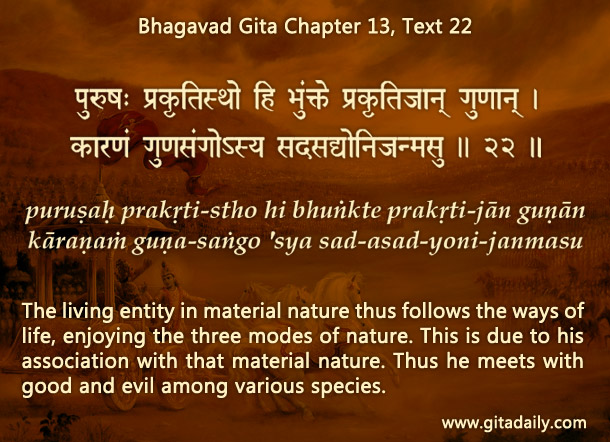People often ask, “If God, the creator of world, is good, why does evil exist in the world?”
Evil arises not from Krishna’s intention but from the soul’s volition.
Though Krishna is omnipotent, he still gives all souls free will so that they can choose to love him and therein relish existence’s supreme fulfillment. After all, only free individuals can choose to love. But the souls can abuse their independence by choosing to not love Krishna but to enjoy matter instead. The Bhagavad-gita (13.22) indicates that due to such desires, the materially enamored souls get entrapped in matter. Impelled by material desires, the souls engage in evil deeds and are subjected to others’ evil actions, as per the inexorable law of karma.
Impelled by material desires, the souls engage in evil deeds and are subjected to others’ evil actions, as per the inexorable law of karma.
The next verse (13.23) underscores Krishna’s role in the souls’ actions: he is the permitter, not the desirer. He doesn’t force or instruct or even want souls to get entangled in matter or to act destructively. When they choose to do wrong, he allows them to fulfill their desires till their karmic bank account runs out. Others may seem to be victimized by such destructive actions, but the victims actually reap the results of their own past karma.
Though the souls have got themselves into this arena of evil, Krishna is too compassionate to abandon them here. He accompanies them as the Supersoul in their hearts and guides them towards his loving devotion, which is the way out of all evil. Devotion empowers them to curb and counter the evil within them – their tendency to misuse their independence. It also enables them to tolerate and transcend the inevitable evil that may befall them due to their past karma. And most importantly it takes them entirely beyond the arena of evil, the material existence, to Krishna’s all-good eternal abode.

Explanation of article:
http://www.youtube.com/watch?v=BJ5y2t0QCGg

Hare Krishna dear prji.
PAMHO. AGTSP. The problem of evil is a very difficult problem in theology for many religions. The answer is given in Gita by Nasato Vidyate and also by Prabhupada when Prabhupada gives the analogy of tiger in a dream. And when SP gives us glimpse into the absolute state by saying the released soul perceives His bondage as just a twinkling in eternal time. In the absolute state all suffering and evil experienced in bondage is perceived in an unaffected manner and in the same way by all liberated souls even if there existed differences, as explained in chapter 14. Krishna being aware of the absolute state of the soul apparently makes a decision which we view as sanctioning evil but from Krishna’s perspective is actually sanctioning good because no evil qualities can exist in Krishna. Unless we get Krishna’s perspective which not even Brahmaji can, words such as Krishna sanctions evil but doesn’t ordain it, must be taken as human attempts to explain phenomena that apparently contradict the verdict of scriptures the Krishna is free from any defects and is of the nature of pure goodness, a verdict we are sure of and we can perceive intuitively but is not easy to express.
Ys
subash
Addressed here:
http://www.thespiritualscientist.com/2014/09/is-the-problem-of-evil-inconceivable-and-beyond-explaining-through-words/
http://www.thespiritualscientist.com/2014/09/is-the-problem-of-evil-inconceivable-and-beyond-explaining-through-words-2/
ys
ccdas
Hare Krishna Dear Prabhuji,
PAMHO. AGTSP. This is a profound topic that has got me deeply thinking. What we understand is that the soul has to make choice between spiritual, sattvic, rajasic, and tamasic actions (with the last two (Rajasic and Tamasic) causing maximum misery, but for the conditioned soul, perhaps the most happiness in material terms). Now if we consider Krishna as the mother and father of all souls, then if we take a real example of a kid with diabetes, will it’s mother allow it to take sweets, the mother will rather force the child not to take the sweet at all costs and have the child cry, because it can have devastating consequences for the child if it were to take the sweets, but are we saying Krishna does not behave like the mother, He doesn’t forcibly prevent the child from eating sweets, but only instructs the child about the bad consequences, is that good enough or as effective ? The only difference I can think of is that Krishna knows that the bad consequences have a beginning and an end (and thus insignificant from the absolute state), and for the soul to be deprived of the material pleasure it’s craving for may be much more painful for the soul (than even the bad consequences) as it evolves towards perfection. Is this explanation correct ?
Ys,
subash
Answered here:
http://www.thespiritualscientist.com/2014/09/when-a-mother-stops-a-child-from-doing-something-harmful-why-does-krishna-not-stop-the-soul-from-wrongdoing/
ys
ccdas
Hare krishna dear prji…
PAMHO. AGTSP…..Thanks many many times for addressing these questions. I learnt many things from ur answers as always and feel more enlightened.
ys
subash